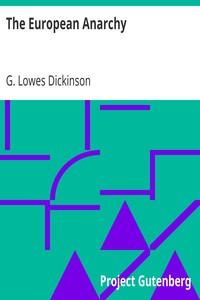|
|
Read this ebook for free! No credit card needed, absolutely nothing to pay.Words: 30916 in 6 pages
This is an ebook sharing website. You can read the uploaded ebooks for free here. No credit cards needed, nothing to pay. If you want to own a digital copy of the ebook, or want to read offline with your favorite ebook-reader, then you can choose to buy and download the ebook.

: The European Anarchy by Dickinson G Lowes Goldsworthy Lowes - World War 1914-1918 Causes; Europe Politics and government@FreeBooksTue 06 Jun, 2023 THE EUROPEAN ANARCHY In the great and tragic history of Europe there is a turning-point that marks the defeat of the ideal of a world-order and the definite acceptance of international anarchy. That turning-point is the emergence of the sovereign State at the end of the fifteenth century. And it is symbolical of all that was to follow that at that point stands, looking down the vista of the centuries, the brilliant and sinister figure of Machiavelli. From that date onwards international policy has meant Machiavellianism. Sometimes the masters of the craft, like Catherine de Medici or Napoleon, have avowed it; sometimes, like Frederick the Great, they have disclaimed it. But always they have practised it. They could not, indeed, practise anything else. For it is as true of an aggregation of States as of an aggregation of individuals that, whatever moral sentiments may prevail, if there is no common law and no common force the best intentions will be defeated by lack of confidence and security. Mutual fear and mutual suspicion, aggression masquerading as defence and defence masquerading as aggression, will be the protagonists in the bloody drama; and there will be, what Hobbes truly asserted to be the essence of such a situation, a chronic state of war, open or veiled. For peace itself will be a latent war; and the more the States arm to prevent a conflict the more certainly will it be provoked, since to one or another it will always seem a better chance to have it now than to have it on worse conditions later. Some one State at any moment may be the immediate offender; but the main and permanent offence is common to all States. It is the anarchy which they are all responsible for perpetuating. While this anarchy continues the struggle between States will tend to assume a certain stereotyped form. One will endeavour to acquire supremacy over the others for motives at once of security and of domination, the others will combine to defeat it, and history will turn upon the two poles of empire and the balance of power. So it has been in Europe, and so it will continue to be, until either empire is achieved, as once it was achieved by Rome, or a common law and a common authority is established by agreement. In the past empire over Europe has been sought by Spain, by Austria, and by France; and soldiers, politicians, and professors in Germany have sought, and seek, to secure it now for Germany. On the other hand, Great Britain has long stood, as she stands now, for the balance of power. As ambitious, as quarrelsome, and as aggressive as other States, her geographical position has directed her aims overseas rather than toward the Continent of Europe. Since the fifteenth century her power has never menaced the Continent. On the contrary, her own interest has dictated that she should resist there the enterprise of empire, and join in the defensive efforts of the threatened States. To any State of Europe that has conceived the ambition to dominate the Continent this policy of England has seemed as contrary to the interests of civilization as the policy of the Papacy appeared in Italy to an Italian patriot like Machiavelli. He wanted Italy enslaved, in order that it might be united. And so do some Germans now want Europe enslaved, that it may have peace under Germany. They accuse England of perpetuating for egotistic ends the state of anarchy. But it was not thus that Germans viewed British policy when the Power that was to give peace to Europe was not Germany, but France. In this long and bloody game the partners are always changing, and as partners change so do views. One thing only does not change, the fundamental anarchy. International relations, it is agreed, can only turn upon force. It is the disposition and grouping of the forces alone that can or does vary. But Europe is not the only scene of the conflict between empire and the balance. Since the sixteenth century the European States have been contending for mastery, not only over one another, but over the world. Colonial empires have risen and fallen. Portugal, Spain, Holland, in turn have won and lost. England and France have won, lost, and regained. In the twentieth century Great Britain reaps the reward of her European conflicts in the Empire on which the sun never sets. Next to her comes France, in Africa and the East; while Germany looks out with discontented eyes on a world already occupied, and, cherishing the same ambitions all great States have cherished before her, finds the time too mature for their accomplishment by the methods that availed in the past. Thus, not only in Europe but on the larger stage of the world the international rivalry is pursued. But it is the same rivalry and it proceeds from the same cause: the mutual aggression and defence of beings living in a "state of nature." Without this historical background no special study of the events that led up to the present war can be either just or intelligible. The feeling of every nation about itself and its neighbours is determined by the history of the past and by the way in which that history is regarded. The picture looks different from every point of view. Indeed, a comprehension of the causes of the war could only be fully attained by one who should know, not only the most secret thoughts of the few men who directly brought it about, but also the prejudices and preconceptions of the public opinion in each nation. There is nobody who possesses these qualifications. But in the absence of such a historian these imperfect notes are set down in the hope that they may offer a counterpoise to some of the wilder passions that sweep over all peoples in time of war and threaten to prepare for Europe a future even worse than its past has been. First, let us remind ourselves in general of the situation that prevailed in Europe during the ten years preceding the war. It was in that period that the Entente between France, Russia, and England was formed and consolidated, over against the existing Triple Alliance between Germany, Austria, and Italy. Neither of these combinations was in its origin and purpose aggressive. On May 30, 1908, Baron Greindl, Belgian Ambassador at Berlin, writes as follows:-- On May 24, 1907, the Comte de Lalaing, Belgian Ambassador at London, writes:-- A certain section of the Press, called here the Yellow Press, bears to a great extent the responsibility for the hostile feeling between the two nations.... It is plain enough that official England is quietly pursuing a policy opposed to Germany and aimed at her isolation, and that King Edward has not hesitated to use his personal influence in the service of this scheme. But it is certainly exceedingly dangerous to poison public opinion in the open manner adopted by these irresponsible journals. Again, on July 28, 1911, in the midst of the Morocco crisis, Baron Guillaume, Belgian Ambassador at Paris, writes:-- I have great confidence in the pacific sentiments of the Emperor William, in spite of the too frequent exaggeration of some of his gestures. He will not allow himself to be drawn on farther than he chooses by the exuberant temperament and clumsy manners of his very intelligent Minister of Foreign Affairs . I feel, in general, less faith in the desire of Great Britain for peace. She would not be sorry to see the others eat one another up.... As I thought from the beginning, it is in London that the key to the situation lies. It is there only that it can become grave. The French will yield on all the points for the sake of peace. It is not the same with the English, who will not compromise on certain principles and certain claims. Having established this general fact that a state of mutual suspicion and fear prevailed between Germany and the Powers of the Triple Entente, let us next consider the positions and purposes of the various States involved. First, let us take Great Britain, of which we ought to know most. Great Britain is the head of an Empire, and of one, in point of territory and population, the greatest the world has ever seen. This Empire has been acquired by trade and settlement, backed or preceded by military force. And to acquire and hold it, it has been necessary to wage war after war, not only overseas but on the continent of Europe. It is, however, as we have already noticed, a fact, and a cardinal fact, that since the fifteenth century British ambitions have not been directed to extending empire over the continent of Europe. On the contrary, we have resisted by arms every attempt made by other Powers in that direction. That is what we have meant by maintaining the "balance of power." We have acted, no doubt, in our own interest, or in what we thought to be such; but in doing so we have made ourselves the champions of those European nations that have been threatened by the excessive power of their neighbours. British imperialism has thus, for four centuries, not endangered but guaranteed the independence of the European States. Further, our Empire is so large that we can hardly extend it without danger of being unable to administer and protect it. We claim, therefore, that we have neither the need nor the desire to wage wars of conquest. But we ought not to be surprised if this attitude is not accepted without reserve by other nations. For during the last half-century we have, in fact, waged wars to annex Egypt, the Soudan, the South African Republics, and Burmah, to say nothing of the succession of minor wars which have given us Zululand, Rhodesia, Nigeria, and Uganda. Odd as it does, I believe, genuinely seem to most Englishmen, we are regarded on the Continent as the most aggressive Power in the world, although our aggression is not upon Europe. We cannot expect, therefore, that our professions of peaceableness should be taken very seriously by outsiders. Nevertheless it is, I believe, true that, at any rate during the last fifteen-years, those professions have been genuine. Our statesmen, of both parties, have honestly desired and intended to keep the peace of the world. And they have been assisted in this by a genuine and increasing desire for peace in the nation. The Liberal Government in particular has encouraged projects of arbitration and of disarmament; and Sir Edward Grey is probably the most pacific Minister that ever held office in a great nation. But our past inevitably discredits, in this respect, our future. And when we profess peace it is not unnatural that other nations should suspect a snare. Free books android app tbrJar TBR JAR Read Free books online gutenberg More posts by @FreeBooks
: Snubby Nose and Tippy Toes by Smith Laura Rountree - Animals Juvenile fiction; Rabbits Juvenile fiction@FreeBooksTue 06 Jun, 2023
|
Terms of Use Stock Market News! © gutenberg.org.in2025 All Rights reserved.






